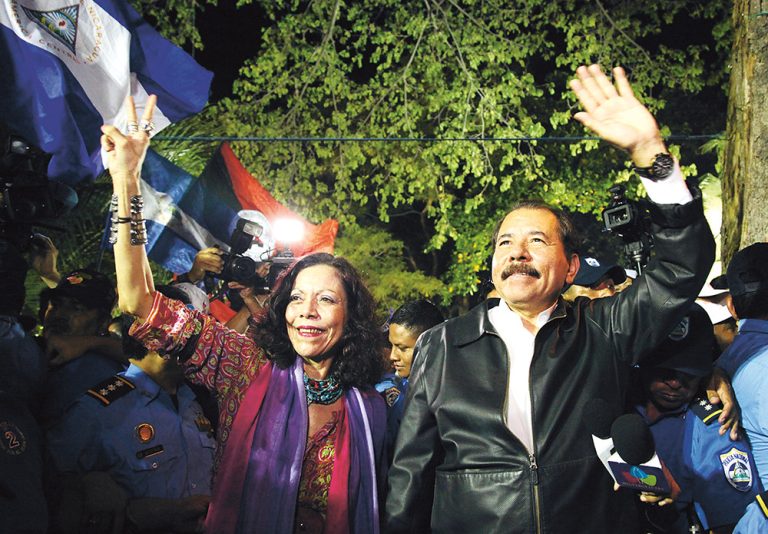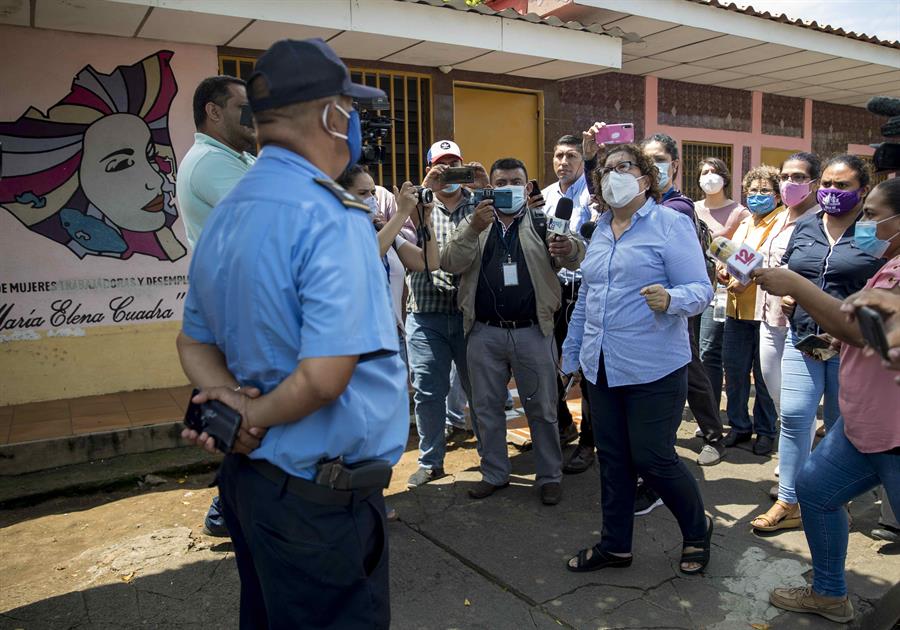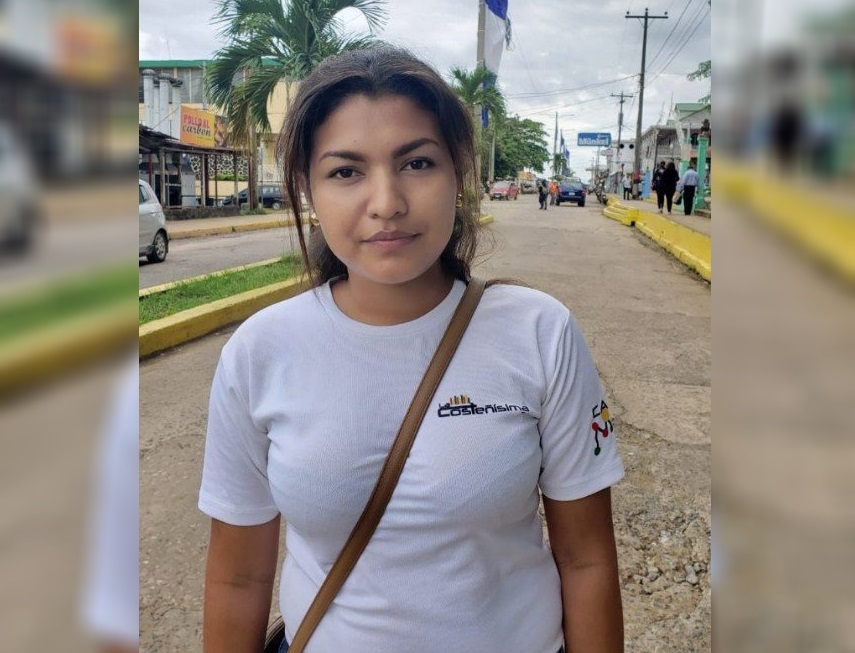28 de septiembre 2020

Children of Exile: The Births “Sowing Hope” in the Camp of Nicaraguan Farmers

PUBLICIDAD 1M
PUBLICIDAD 4D
PUBLICIDAD 5D
Today's news report: siege against the María Elena Cuadra movement, journalist found "guilty" of slander, and a law proposal to segregate Nicaraguans

Analysts of international issues believe that the approval of these punitive laws will also have effects on the session of the OAS
These are the news that you need to know today, September 28th | The Ortega deputies have presented an initiative called “Law for the Regulation of Foreign Agents”, that seeks to segregate Nicaraguans and create two categories: real and foreign agents, to the National Assembly.
Claiming the defense of the “sovereignty and security of the State”, the regime now aims to control natural and legal persons who receive foreign funds. According to the Sandinista party, these funds used to “carry out activities that result in interference by governments or foreign organizations in the internal affairs of Nicaragua”.
According to jurists consulted by CONFIDENCIAL, this will force citizens to register as foreign agents and submit accounts to the Ministry of Interior, which opens the possibility that their assets may be seized.
“Ortega has reached the pinnacle of totalitarianism. If you compare it (the current proposal) to the Putin Law, of Russia, or with the Venezuelan law, it has totally surpassed the universe of citizens which are subject to the law. Anyone can be subjected to it”, Pallais warned in an interview with the Esta Noche tv show.

Photo: EFE | Confidencial
This Friday, the Nicaraguan National Police imposed a four-hour siege on the offices of the Autonomous Women’s Movement Maria Elena Cuadra, preventing the personnel of this organization, which works in defense of trade union women, from entering the facilities.
Sandra Ramos, director of the Maria Elena Cuadra movement, denounced the blockade of the organization's work as a prelude to what could happen with the so-called “Law on Regulation of Foreign Agents”, and called on the police to withdraw and stop the repressive escalation.
“The Maria Elena Cuadra (movement) is not a terrorist organization or anything like it. We are a lot of women who defend other women,” said the director outside the organization. Hours later, the National Police withdrew from the scene without explaining the reasons for their presence.

Judge Deyanira Traña, judge of the Local Criminal Court of Bluefields, declared journalist Kalúa Salazar, press officer of Radio La Costeñísima, guilty of the alleged crime of slander, after the publication of a report titled “Corruption in the Mayoralty of El Rama municipality uncovered”.
Salazar’s defense attorney stated that during the trial and evidence evaluation her guilt was not proven, since in the published report an anonymous person pointed out four workers from the El Rama mayor’s office of alleged misuse of funds. The journalist considers that the sentence seeks to criminalize journalistic work in the country.
“They are criminalizing independent journalism. If a citizen comes to La Costeñísima to make a public complaint, we will accept it. The fact that we are going through this does not mean that when a citizen comes to the radio, we will tell him we cannot (receive his complaint), because we have a lawsuit. No. We are going to receive all public complaints (...) our microphones will always be open.” Salazar said as she left the Bluefields Judicial Complex.
Although they are not signatories of the electoral reforms document presented by the Electoral Reform Promoter Group, the Superior Council of Private Enterprise (COSEP), the Nicaraguan Foundation for Economic and Social Development (FUNIDES), and the American Chamber of Commerce (AMCHAM), expressed their support for the proposals.
AmCham considers it “imperative to restore democratic order” in Nicaragua, while COSEP warned that democracy is essential to resume social, political, and economic development.
Funides considers that the proposal provides concrete solutions to overcome the political crisis in which Nicaragua has been immersed since April 2018.
The Civic Alliance for Justice and Democracy will decide with ⅔ of its 2 votes whether to remain or withdraw from the National Coalition, in a voting process that is expected to be complex, despite the fact that the withdrawal has the support of the business and student sectors.
Five sectors constitute the plenary session of the Civic Alliance: the business sector (five members), youth and students sector (four), political sector (three), academic sector (three), the representatives of the Caribbean Coast (three), the civil society sector (two), and the labor sector, made up of doctors and teachers(votes).
Voting was postponed last week due to the police siege against the María Elena Cuadra Movement but remains on the agenda for the upcoming days.
The Ortega regime questioned the reports of the High Commissioner for Human Rights of the United Nations (UN), which confirmed the permanent repression in which Nicaraguan civil society has lived since April 2018.
Foreign Minister Denis Moncada called the reports false and said that the resolutions are unilateral, lacking in objectivity and that they are directed against the peoples of Nicaragua and Venezuela.
The foreign minister, however, did not mention anything about the widely documented evidence on the human rights violations committed by the Ortega-Murillo regime in the country, which have been denounced by national and international organizations.
This article has been translated by Ana Maria Sampson, a Communication Science student at the University of Amsterdam and member of our staff*
Archivado como:
PUBLICIDAD 3M
Confidencial es un diario digital nicaragüense, de formato multimedia, fundado por Carlos F. Chamorro en junio de 1996. Inició como un semanario impreso y hoy es un medio de referencia regional con información, análisis, entrevistas, perfiles, reportajes e investigaciones sobre Nicaragua, informando desde el exilio por la persecución política de la dictadura de Daniel Ortega y Rosario Murillo.
PUBLICIDAD 3D